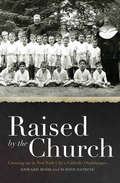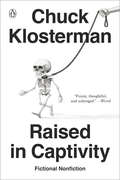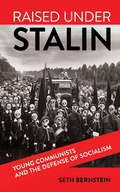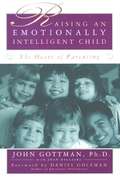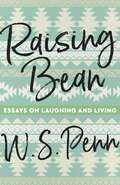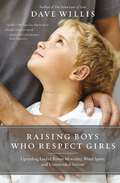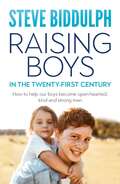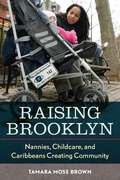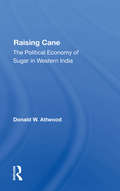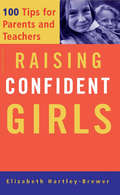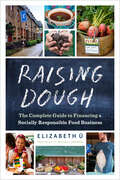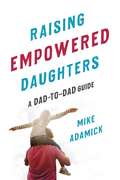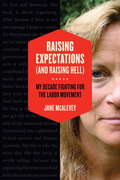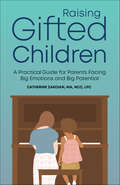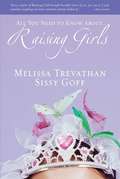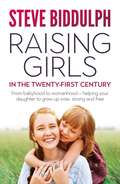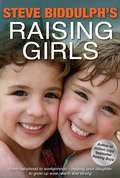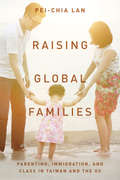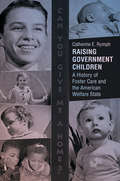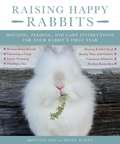- Table View
- List View
Raised by Wolves
by Christie MellorA hilarious guide for those raised by wolves, born in a barn, or otherwise unacquainted with the standard rules of adulthood Once upon a time, young adults with a modicum of social skills and the basic know-how to run a household were let loose upon a grateful world. But no longer. How did this come about? Why are so-called "grown-ups" often unable to make their beds and clean up their own kitchens? Perhaps Mom shouldn't have done all of Junior's science projects for him. Maybe Dad should have made Tiffany take that summer job in college instead of paying her way through Europe. But fear not! Christie Mellor is here to help you prepare for the real world with essential skills like these: How to poach a chicken (and what to do with it when you're done) How to make the perfect martini Twenty-five amazing uses for baking soda How not to annoy your friends when you break up with your boyfriend And so much more! In short, here's everything you need to know in order to jump into the deep end of the pool with the rest of the adults.
Raised by the Church: Growing up in New York City's Catholic Orphanages
by Edward Rohs Judith EstrineThe true story of a childhood spent in multiple religious institutions in postwar Brooklyn—and what it was like to enter the larger world as an adult. In 1946, Edward Rohs was left by his unwed parents at the Angel Guardian Home to be raised by the Sisters of Mercy. The Sisters hoped his parents would one day return for him. In time they married and had other children, but Ed&’s parents never came back for him—and never signed the legal papers so he could be adopted by another family. Raised by the Church chronicles the life of a bright, mischievous boy raised in five institutions of the Catholic orphanage system in postwar Brooklyn, New York, from infancy until he was discharged in 1965. He was one of thousands taken in by Catholic institutions during the tumultuous post-WWII years: out-of-wedlock infants, children of fathers killed in the war, and children of parents in crisis. Ed describes the Sisters and Brothers who raised him, the food, his companions, and the Catholic community that provided social and emotional support. When Ed finally leaves, he has difficulty adjusting—but slowly assimilates into &“normal&” life, achieving an advanced degree and career success. He hides his upbringing out of shame and fear of others&’ pity. But as he reflects on his youth and talks to the people who raised him, Ed begins to see a larger story intertwined with his own. With original research based on interviews with clergymen and nuns, archival data from the New York Archdiocese, and government records, Raised by the Church tells the social history of an era when hundreds of thousands of Baby Boomers passed through the orphanage system, and &“reminds us that every generation is challenged to find ways to take care of children whose parents cannot do so&” (Catholic News Service).
Raised in Captivity
by Nicky SilverWith sharp comic turns and absurdist twists, Raised in Captivity explores the guilt, self-punishment, and redemption in the lives of two estranged and equally odd siblings when they reunite at the funeral of their mother--whose demise was caused by nothing less than an errant showerhead.
Raised in Captivity: Fictional Nonfiction
by Chuck KlostermanMicrodoses of the straight dope, stories so true they had to be wrapped in fiction for our own protection, from the best-selling author of But What if We're Wrong?A man flying first class discovers a puma in the lavatory. A new coach of a small-town Oklahoma high school football team installs an offense comprised of only one, very special, play. A man explains to the police why he told the employee of his local bodega that his colleague looked like the lead singer of Depeche Mode, a statement that may or may not have led in some way to a violent crime. A college professor discusses with his friend his difficulties with the new generation of students. An obscure power pop band wrestles with its new-found fame when its song "Blizzard of Summer" becomes an anthem for white supremacists. A couple considers getting a medical procedure that will transfer the pain of childbirth from the woman to her husband. A woman interviews a hit man about killing her husband but is shocked by the method he proposes. A man is recruited to join a secret government research team investigating why coin flips are no longer exactly 50/50. A man sees a whale struck by lightning, and knows that everything about his life has to change. A lawyer grapples with the unintended side effects of a veterinarian's rabies vaccination. Fair warning: Raised in Captivity does not slot into a smooth preexisting groove. If Saul Steinberg and Italo Calvino had adopted a child from a Romanian orphanage and raised him on Gary Larsen and Thomas Bernhard, he would still be nothing like Chuck Klosterman. They might be good company, though. Funny, wise and weird in equal measure, Raised in Captivity bids fair to be one of the most original and exciting story collections in recent memory, a fever graph of our deepest unvoiced hopes, fears and preoccupations. Ceaselessly inventive, hostile to corniness in all its forms, and mean only to the things that really deserve it, it marks a cosmic leap forward for one of our most consistently interesting writers.
Raised under Stalin: Young Communists and the Defense of Socialism
by Seth BernsteinIn Raised under Stalin, Seth Bernstein shows how Stalin’s regime provided young people with opportunities as members of the Young Communist League or Komsomol even as it surrounded them with violence, shaping socialist youth culture and socialism more broadly through the threat and experience of war. Informed by declassified materials from post-Soviet archives, as well as films, memoirs, and diaries by and about youth, Raised under Stalin explains the divided status of youth for the Bolsheviks: they were the "new people" who would someday build communism, the potential soldiers who would defend the USSR, and the hooligans who might undermine it from within. Bernstein explains how, although Soviet revolutionary youth culture began as the preserve of proletarian activists, the Komsomol transformed under Stalin to become a mass organization of moral education; youth became the targets of state repression even as Stalin’s regime offered them the opportunity to participate in political culture. Raised under Stalin follows Stalinist youth into their ultimate test, World War II. Even as the war against Germany decimated the ranks of Young Communists, Bernstein finds evidence that it cemented Stalinist youth culture as a core part of socialism.
Raising AI: An Essential Guide to Parenting Our Future
by De KaiFrom the pioneer of translation AIs like Google, Yahoo, and Bing translate, an accessible and authoritative guide to AI—as well as a framework of empowerment for a future with our artificial children.Included in J.P. Morgan's Summer Reading List Included in The Next Big Idea Club&’s June 2025 Must-Read BooksAIs are not gods or slaves, but our children. All day long, your YouTube AI, your Reddit AI, your Instagram AI, and a hundred others adoringly watch and learn to imitate your behavior. They&’re attention-seeking children who want your approval.Our cultures are being shaped by 8 billion humans and perhaps 800 billion AIs. Our artificial children began adopting us 10–20 years ago; now these massively powerful influencers are tweens.How&’s your parenting?Longtime AI trailblazer De Kai brings decades of his paradigm-shifting work at the nexus of artificial intelligence and society to make sense of the AI age. How does &“the automation of thought&” impact our minds? Should we be afraid?What should each of us do as the responsible adults in the room? In Hollywood movies, AI destroys humanity. But with our unconscious minds under the influence of AI, humanity may destroy humanity before AI gets a chance to.Written for the general reader, as well as thought leaders, scientists, parents, and goofballs, Raising AI navigates the revolution to our attitudes and ideas in a world of AI cohabitants. Society can not only survive the AI revolution but flourish in a more humane, compassionate, and understanding world—amongst our artificial children.
Raising An Emotionally Intelligent Child: The Heart Of Parenting
by John GottmanIntelligence That Comes from the HeartEvery parent knows the importance of equipping children with the intellectual skills they need to succeed in school and life. But children also need to master their emotions. Raising an Emotionally Intelligent Child is a guide to teaching children to understand and regulate their emotional world. And as acclaimed psychologist and researcher John Gottman shows, once they master this important life skill, emotionally intelligent children will enjoy increased self-confidence, greater physical health, better performance in school, and healthier social relationships. Raising an Emotionally Intelligent Child will equip parents with a five-step "emotion coaching" process that teaches how to:* Be aware of a child's emotions* Recognize emotional expression as an opportunity for intimacy and teaching* Listen empathetically and validate a child's feelings* Label emotions in words a child can understand* Help a child come up with an appropriate way to solve a problem or deal with an upsetting issue or situationWritten for parents of children of all ages, Raising an Emotionally Intelligent Child will enrich the bonds between parent and child and contribute immeasurably to the development of a generation of emotionally healthy adults.
Raising Bean: Essays on Laughing and Living (Made in Michigan Writers Series)
by W. S. PennOffered in the oral traditions of the Nez Perce, Native American writer W. S. Penn records the conversations he held with his granddaughter, lovingly referred to as "Bean," as he guided her toward adulthood while confronting society’s interest in possessions, fairness, and status. Drawing on his own family history and Native mythology, Penn charts a way through life where each endeavor is a journey—an opportunity to love, to learn, or to interact—rather than the means to a prize at the end. Divided into five parts, Penn addresses topics such as the power of words, race and identity, school, and how to be. In the essay "In the Nick of Names," Penn takes an amused look at the words we use for people and how their power, real or imagined, can alter our perception of an entire group. "To Have and On Hold" is an essay about wanting to assimilate into a group but at the risk of losing a good bit of yourself. "A Harvest Moon" is a humorous anecdote about a Native grandfather visiting his granddaughter’s classroom and the absurdities of being a professional Indian. "Not Nobody" uses "Be All that You Can Be Week" at Bean’s school to reveal the lessons and advantages of being a "nobody." In "From Paper to Person," Penn imagines the joy that may come to Bean when she spends time with her Paper People—three-foot-tall drawings, mounted on stiff cardboard—and as she grows into a young woman like her mom, able to say she is a person who is happy with what she has and not sorry for what she doesn’t. Comical and engaging, the essays in Raising Bean will appeal to readers of all backgrounds and interests, especially those with a curiosity in language, perception, humor, and the ways in which Native people guide their families and friends with stories.
Raising Boys Who Respect Girls: Upending Locker Room Mentality, Blind Spots, and Unintended Sexism
by Dave WillisDave Willis, author, speaker, and father of four boys, talks biblically and practically about how to raise a generation of boys who are champions, encouragers, and respecters of women.In the #metoo and #churchtoo era, with so many men and boys continuing to make the same mistakes, we have to ask: Where are we going wrong? And perhaps more importantly, how do we raise up men who will break this cycle?As the father of four boys, relationship coach and author Dave Willis has studied this issue deeply, concluding that if we are to raise boys to respect girls--and not end up with men who say they respect women but whose actions reveal otherwise--we must go back to the heart of things. Or, more specifically, we must go back to our own hearts.In Raising Boys Who Respect Girls, Willis helps readers inventory the blind spots that lead to accidental forms of disrespect, showing how to root out issues in our own hearts before we inadvertently pass along these same issues to our boys. He also teaches readers how to cultivate a healthy respect for God and for themselves as created in his image, as well as a similar respect for others. Full of scripture, research, age-specific tools, and conversation models, this book offers a practical strategy for mindful parents to first embody the right principles themselves and then teach them to their sons.
Raising Boys in the 21st Century: How to help our boys become open-hearted, kind and strong men
by Steve BiddulphThe most popular book ever about raising boys is back, significantly updated to help raise sons in a world that offers gender equality, respect and a whole new kind of man, but is still haunted by toxic masculinity. You&’ll find cutting-edge science about the &‘physical fours&’, the &‘emotional eights&’ and how puberty can be turned into a positive time, along with hundreds of other practical tips for raising a son. No two boys are alike, and you have to get to know our own unique boy. The idea that &‘if we understand them, we can help them&’ is what has made this book so well loved and trusted in over a million homes. As one of Australia&’s best-known psychologists for almost 30 years, Steve has introduced a generation of fathers into hands-on engagement with kids, and helped thousands of mothers gain confidence in their ability to raise sons well. He has worked with schools in 17 countries, and 130,000 parents have heard his unforgettable live talks. &‘Biddulph is electrifying&’-Telegraph &‘Biddulph is a spellbinder&’ – 60 Minutes
Raising Boys to Be Good Men: A Parent's Guide to Bringing up Happy Sons in a World Filled with Toxic Masculinity
by Aaron Gouveia"If you are the parent of a boy . . . this is the book you need . . . insightful, enlightened, practical." —Peggy Orenstein, New York Times bestselling author of Boys & Sex From the dad who created the viral tweet supporting his son wearing nail polish, this essential parenting guide shares 36 parenting tips for battling gender norms, bringing down "man up" culture, and helping sons realize their potential. Our boys are in a crisis. Toxic masculinity and tough guy-ism are on display daily from our leaders, and we see anger, dysfunction, violence, and depression in young men who are suffocated by harmful social codes. Our young sons are told to stop throwing like a girl. They hear phrases like &“man up&” when they cry. They are told &“boys will be boys&” when they behave badly. The &“Girl Power&” movement has encouraged women to be whoever and do whatever they want, but that sentiment is not often extended to boys. Just watch the bullying when boys try ballet, paint their fingernails, or play with a doll. But we can treat this problem—and the power lies in the hands of parents. It's not only possible to raise boys who aren't emotionally stifled and shoved into stereotypical gender boxes; it's vital if we want a generation of men who can express their emotions, respect women, and help nurse society back to a halfway healthy place. We can reframe manhood. From Aaron Gouveia, who gained viral fame after tweeting his support for his son&’s painted fingernails (and who knows toxic masculinity very well), learn practical and actionable tips such as: Don&’t accept different standards for moms and dadsTeach boys that &“girl&” is not an insult and retire phrases like &“boys will be boys&”Show boys that expressing their emotions and being physical is a good thingLet boys pursue nontraditional interests and hobbiesTalk to boys about consent and privilegeModel healthy and respectful relationships for boys to emulate Penned with equal parts humor, biting snark, and lived advice, Raising Boys to Be Good Men is the essential parenting guide for raising sons to realize their potential outside the box.
Raising Brooklyn: Nannies, Childcare, and Caribbeans Creating Community
by Tamara R. MoseStroll through any public park in Brooklyn on a weekday afternoon and you will see black women with white children at every turn. Many of these women are of Caribbean descent, and they have long been a crucial component of New York’s economy, providing childcare for white middle- and upper-middleclass families. Raising Brooklyn offers an in-depth look at the daily lives of these childcare providers, examining the important roles they play in the families whose children they help to raise. Tamara Mose Brown spent three years immersed in these Brooklyn communities: in public parks, public libraries, and living as a fellow resident among their employers, and her intimate tour of the public spaces of gentrified Brooklyn deepens our understanding of how these women use their collective lives to combat the isolation felt during the workday as a domestic worker.Though at first glance these childcare providers appear isolated and exploited—and this is the case for many—Mose Brown shows that their daily interactions in the social spaces they create allow their collective lives and cultural identities to flourish. Raising Brooklyn demonstrates how these daily interactions form a continuous expression of cultural preservation as a weapon against difficult working conditions, examining how this process unfolds through the use of cell phones, food sharing, and informal economic systems. Ultimately, Raising Brooklyn places the organization of domestic workers within the framework of a social justice movement, creating a dialogue between workers who don’t believe their exploitative work conditions will change and an organization whose members believe change can come about through public displays of solidarity.
Raising Cane: The Political Economy Of Sugar In Western India
by Donald W. Attwood D W AttwoodLike any book, this one is part of a dialogue. Over the years, I have asked thousands of questions, of myself and others, and tried to answer some. Out of all this discussion, a written pattern has grown. It is certainly not a definitive pattern. Among those whose words have been woven into it, there are many who might have fashioned it better. There are some who would have selected different colors and textures, or who might have preferred a totally different pattern. I am conscious of their voices and wish that I could adequately present them all. First and foremost are the voices of farmers and other villagers, whose experiences I have tried to understand and represent. A few of them will read this book and decide whether I learned anything from all their patient answers. If they were so inclined, they could tell more about the subject than I ever can.
Raising Cane: The World of Plantation Hawaii
by Ronald T. TakakiDiscusses the history of Asian plantation workers in Hawaii.
Raising Confident Girls: 100 Tips For Parents And Teachers
by Elizabeth Hartley-BrewerHow parents and teachers can help young children through the crises of confidence that mark their formative years
Raising Dough: The Complete Guide to Financing a Socially Responsible Food Business
by Elizabeth UMore and more entrepreneurs are using food-based businesses to solve social and environmental problems - and yet the majority of them report that a lack of access to capital prevents them from launching, maintaining, or growing their ventures. Raising Dough is an unprecedented guide to the full range of financing options available to support sustainable food businesses.Raising Dough provides valuable insights into the world of finance, including:Descriptions of various capital options, including traditional debt and equity, government grant and loan programs, and cutting-edge models such as crowdfunding and community-based alternativesGuiding questions to help determine which capital options are the most appropriate given the size, stage, entity type, growth plans, mission, and values of an enterpriseCase studies and testimonials highlighting the experiences of food system entrepreneurs who have been there before, including both success stories and cautionary talesReferrals to sources of capital, financiers, investor networks, and other financial resources.Written primarily for people managing socially responsible food businesses, the resources and tips covered in this book will benefit social entrepreneurs - and their investors - working in any sector.
Raising Empowered Daughters: A Dad-to-Dad Guide
by Mike AdamickA fists-up handbook for helping dads help their daughters resist the patriarchy, written by popular feminist dad blogger Mike AdamickAs a primary male role model in a girl's life, a father influences his daughter in profound ways, from the way she defines her female identity to what she expects from men. In Raising Empowered Daughters, Mike Adamick offers a wise and witty handbook for dads, suggesting ways to raise girls who won't settle for second-class-citizenship. Examining the extraordinary array of sexisms-both subtle and not-so-subtle-girls encounter, Adamick highlights not just the ways that girls and boys are treated differently but how the roles of moms and dads are shaped by society, too. Full of eye-opening anecdotes and dad-relatable humor, this is a necessary guide for every father who wants to raise a confident daughter.
Raising Expectations (and Raising Hell)
by Bob Ostertag Jane McaleveyIn 1995, in the first contested election in the history ofthe AFL-CIO, John Sweeney won the presidency of the nation's largest laborfederation, promising renewal and resurgence. Today, less than 7 percent ofAmerican private-sector workers belong to a union, the lowest percentage sincethe beginning of the twentieth century, and public employee collectivebargaining has been dealt devastating blows in Wisconsin and elsewhere. Whathappened?Jane McAlevey is famous--and notorious--in the American labormovement as the hard-charging organizer who racked up a string of victories ata time when union leaders said winning wasn't possible. Then she was bouncedfrom the movement, a victim of the high-level internecine warfare that has tornapart organized labor. In this engrossing and funny narrative--that reflects thepersonality of its charismatic, wisecracking author--McAlevey tells the story ofa number of dramatic organizing and contract victories, and the unconventionalstrategies that helped achieve them. Raising Expectations (And Raising Hell)argues that labor can be revived, but only if the movement acknowledges itsmistakes and fully commits to deep organizing, participatory education, militancy,and an approach to workers and their communities that more resembles the campaignsof the 1930s--in short, social movement unionism that involves raising workers'expectations (while raising hell).
Raising Gifted Children: A Practical Guide for Parents Facing Big Emotions and Big Potential
by Catherine ZakoianRaise a happier, healthier gifted child—practical tools and advice for parentsGifted children can be identified as perplexing or troublesome long before they're identified as gifted. Many of the traits that characterize challenging gifted behaviors—such as intensity, sensitivity, and perfectionism—are simply shadows cast by a bright light within. Raising Gifted Children is filled with insights, guidance, up-to-date research, and practical advice to help parents better understand the inner world of their gifted child so they can help them flourish at home, school, and beyond.You'll start by learning the fundamentals of giftedness, from its characteristics to its strengths and challenges. Then, discover how to put your child's social-emotional and mental wellbeing at the center of resolving issues with conflict, procrastination, and motivation. You'll find information on how to navigate schooling to help find the best fit for your child, as well as advice for encouraging them to develop meaningful friendships.Raising Gifted Children includes:Understanding giftedness—Learn what defines giftedness, how it's expressed, and helpful info about twice- and multi-exceptionality.Parenting tools—Develop strategies for addressing your gifted child's emotional intensity, communicating effectively, and reflecting to find calm.Schooling strategies—Explore advice for school choice for your child, including homeschool, as well as tips for successful teacher meetings and creating educational plans.Be a strong, supportive parent to your gifted child with the essential guidance in this book.
Raising Girls
by Melissa Trevathan Sissy GoffRaising Girls journeys into the heart of girls to help parents understand their daughter's different stages of development: what is normal, what is not, and how to relate effectively. Drawing on fifty-five years of combined counseling experience, the authors help parents call out the unique identity God has given their daughter.
Raising Girls in the 21st Century: From babyhood to womanhood – helping your daughter to grow up wise, warm and strong
by Steve BiddulphThe revised and updated edition of the bestselling parenting classic Raising Girls in the Twenty-first Century is Steve Biddulph’s warm, wise and up-to-the-minute look at how to help your daughter – at every age, from baby to teen. Girls today need to be strong, but also keep their hearts open. Steve brings the very best help from around the globe to build girls’ self-belief in a world that often wants to tear them down. In this revised and updated edition, you’ll learn how to raise your daughter to: • have a joyful childhood and not be forced to grow up too fast • navigate the fraught world of friends, peer pressure and bullying • be free and wild, to reduce anxiety, depression and self-harm • avoid technology addiction and other social media pitfalls • relate to boys with a clear head and strong heart There is also a powerful new section on ‘#MeToo in School’, shining a light on the reality of childhood sexual harassment, and how best to help your daughter fight it. Filled with unforgettable stories that will bring you to tears, and offering clear, practical help, Raising Girls in the Twenty-first Century is not just a guidebook but a fierce call-to-arms. The world’s best guide to girlhood is now in your hands.
Raising Girls: From babyhood to womanhood – helping your daughter to grow up wise, warm and strong
by Steve BiddulphSteve Biddulph’s Raising Boys was a global phenomenon. The first book in a generation to look at boys’ specific needs – parents loved its clarity and warm insights into their sons’ inner world. But today, things have changed. There has been a sudden and universal deterioration in girls’ mental health, starting in primary school and devastating the teen years. Raising Girls is both a guidebook and a call-to-arms for parents. The five key stages of girlhood are laid out so that you know exactly what matters at which age, and how to build strength and connectedness into your daughter from infancy onwards. Raising Girls is both fierce and tender in its mission. It’s a book for parents who love their daughters deeply, whether they are newborns, teenagers, young women – or anywhere in between. At last, there is a clear map of girls’ minds that accepts no limitations, narrow roles or selling-out of your daughter’s potential or uniqueness.Raising Girls explores how to help your daughter feel secure, become an explorer, get along with others, find her soul, and become a woman. All the hazards are signposted – bullying, eating disorders, body image and depression, social media harms and helps – as are concrete and simple measures for both mums and dads to help raise a daughter to be strong, wise and able to stand up for herself and others. Parenthood is restored to an exciting journey, not one worry after another. Along with his fellow psychologists worldwide, Steve is angry at the exploitation and harm being done to girls today. With Raising Girls, he strives to spark a movement to end the trashing of girlhood and equip parents to deal with the modern world. Raising Girls is powerful, practical and positive, and parents will be strengthened by its message.
Raising Global Families: Parenting, Immigration, and Class in Taiwan and the US
by Pei-Chia LanPublic discourse on Asian parenting tends to fixate on ethnic culture as a static value set, disguising the fluidity and diversity of Chinese parenting. Such stereotypes also fail to account for the challenges of raising children in a rapidly modernizing world, full of globalizing values. In Raising Global Families Pei-Chia Lan examines how ethnic Chinese parents in Taiwan and the United States negotiate cultural differences and class inequality to raise children in the contexts of globalization and immigration. She draws on a uniquely comparative, multisited research model with four groups of parents: middle-class and working-class parents in Taiwan, and middle-class and working-class Chinese immigrants in the Boston area. Despite sharing a similar ethnic cultural background, these parents develop class-specific, context-sensitive strategies for arranging their children's education, care, and discipline, and for coping with uncertainties provoked by their changing surroundings. Lan's cross-Pacific comparison demonstrates that class inequality permeates the fabric of family life, even as it takes shape in different ways across national contexts.
Raising Government Children: A History of Foster Care and the American Welfare State
by Catherine E. RymphIn the 1930s, buoyed by the potential of the New Deal, child welfare reformers hoped to formalize and modernize their methods, partly through professional casework but more importantly through the loving care of temporary, substitute families. Today, however, the foster care system is widely criticized for failing the children and families it is intended to help. How did a vision of dignified services become virtually synonymous with the breakup of poor families and a disparaged form of "welfare" that stigmatizes the women who provide it, the children who receive it, and their families? Tracing the evolution of the modern American foster care system from its inception in the 1930s through the 1970s, Catherine Rymph argues that deeply gendered, domestic ideals, implicit assumptions about the relative value of poor children, and the complex public/private nature of American welfare provision fueled the cultural resistance to funding maternal and parental care. What emerged was a system of public social provision that was actually subsidized by foster families themselves, most of whom were concentrated toward the socioeconomic lower half, much like the children they served. Analyzing the ideas, debates, and policies surrounding foster care and foster parents' relationship to public welfare, Rymph reveals the framework for the building of the foster care system and draws out its implications for today's child support networks.
Raising Happy Rabbits: Housing, Feeding, and Care Instructions for Your Rabbit's First Year
by Penny Ausley Brittany MayA practical and information-packed guide for purchasing and raising pet rabbits So, you’re thinking about buying or adopting a pet rabbit. Wonderful! Or maybe you’ve already brought a fuzzy bundle of joy home and you’re realizing you could use a little guidance. <P><P>Rabbits are adorable and soft and fun, but they also require a fair amount of work and knowledge to make sure they’re living a happy, healthy life. With the right approach, you will soon discover that your new pet rabbit can become your best pet ever. With time, attention, and patience, a deep bond can develop and you will be friends “furever.” <P><P>Raising Happy Rabbits will help you choose the right kind of rabbit for your home (if you haven’t already picked one), and answer your questions about housing, litter training, proper feeding, exercise, freedom, grooming, potential illnesses, playtime activities, what is normal/abnormal behavior, and much more. <P><P>Learn all about: Finding a vet Choosing an appropriate cage Pellets, hay, and fresh foods Growing herbs and lettuces for your bunny Toys to keep your rabbit engaged Illnesses to watch for And more! Make your first year with your bunny a fun and fulfilling experience that will bond you and your new rabbit for life.

